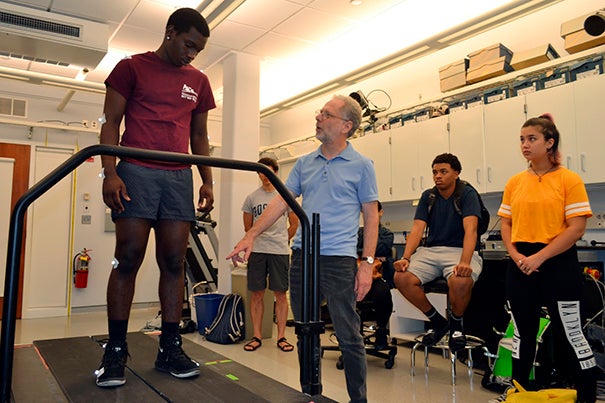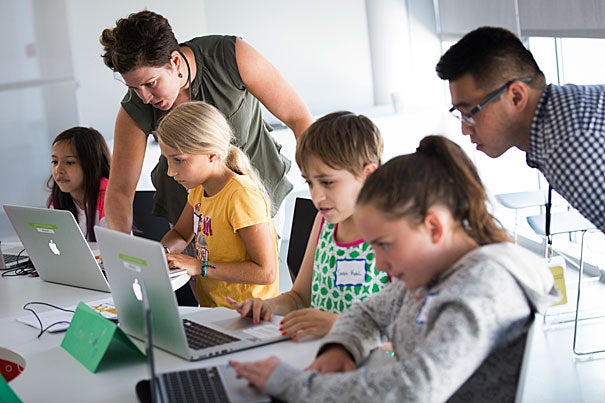
Cambridge-Harvard Summer Academy student Simão Silva (left) gets running tips from Harvard Professor Daniel Lieberman.
Courtesy of Daniel Lieberman
Lab learning scores with teen athletes
Harvard program gives students valuable insight into how body works
More like this
For high school student Simão Silva, visiting a biology lab at Harvard was just part of his summer school curriculum. What the 17-year-old Cristo Rey High School student didn’t plan on this summer was receiving practical lessons about the human body and biochemistry.
After his Harvard experience, the student athlete is now focusing on how to improve his running technique, and is even talking about how to become a biochemist. Silva credits Harvard Professor Daniel Lieberman, Edwin M. Lerner II Professor of Biological Sciences, for teaching him about the mechanics of running.
“I went running a few days later and what [Lieberman] had talked about really made me think and notice what I was doing,” said Silva, who is a wrestler, boxes, runs track, and plays soccer.
Silva was among a group of local high school biology students visiting Harvard’s Department of Human and Evolutionary Biology to conduct a lab session with Lieberman as part of the Cambridge-Harvard Summer Academy. The six-week summer school program provided both enrichment opportunities and remedial classes at Cambridge Rindge and Latin High School. The program, which has served more than 4,500 local students since it began in 2001, is a partnership between the Harvard Graduate School of Education and Cambridge Public Schools.
“Science is a process and it’s nice to show students how we get to where we are now, and how we collect data, analyze data, and make predictions,” Lieberman said.
It was that special day on the fourth floor of the Peabody Museum of Archaeology and Ethnology, that Silva got a peak into the world of biochemistry.
“I’ve always been interested in working in a bio lab, so when I got the opportunity to visit one it was really cool and showed me I want to be a biochemist even more,” he said.
Silva’s biology teacher, Quan Le, ’15, recently completed the Harvard Graduate School of Education’s Harvard Teacher Fellows program and tries to introduce “fun” and practicality into his lessons to make them as applicable to the real world as possible. Since many of his students are athletes, Le said he looks for ways to apply science to their passions and interests.
“Professor Lieberman was able to make this lab really about how you can use science in your own life,” said Le. “This is science and it is related to evolution, but it can be useful if you’re an athlete. He was able to make it very personal.”
The students were thrilled at the idea of visiting a Harvard research lab to learn about biomechanics and how it related to their athletic endeavors, Le said. He first became interested in teaching while volunteering with the Phillips Brooks House Association’s (PBHA) Boston Refugee Youth Enrichment program (BRYE) as an undergrad.
“When I started volunteering with BRYE through PBHA and teaching during the semesters, I felt like my identity as an immigrant and first-generation student really mattered,” said Le. “I could really relate to these kids.”
Cambridge-Harvard Summer Academy is one of many partnerships and programs that Harvard and Cambridge Public Schools utilize to enhance student performance. The programs range from curriculum-based efforts as well as individualized learning programs serving students of all grade levels.
“When students understand why and what they learn, it can make a big difference. We really tried to do that here. It’s not just science for the sake of science,” Le said. “Everything involves science. Once they get that — you can really see their interest levels change. And if we can do that, I would consider that a success.”





